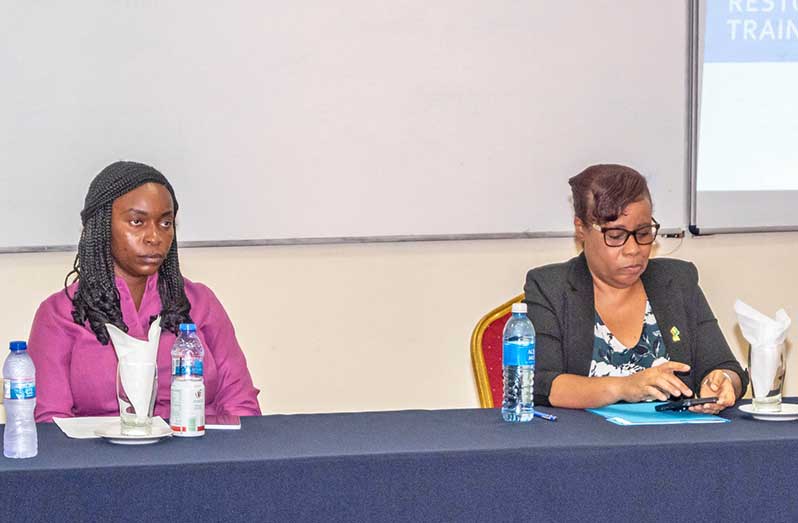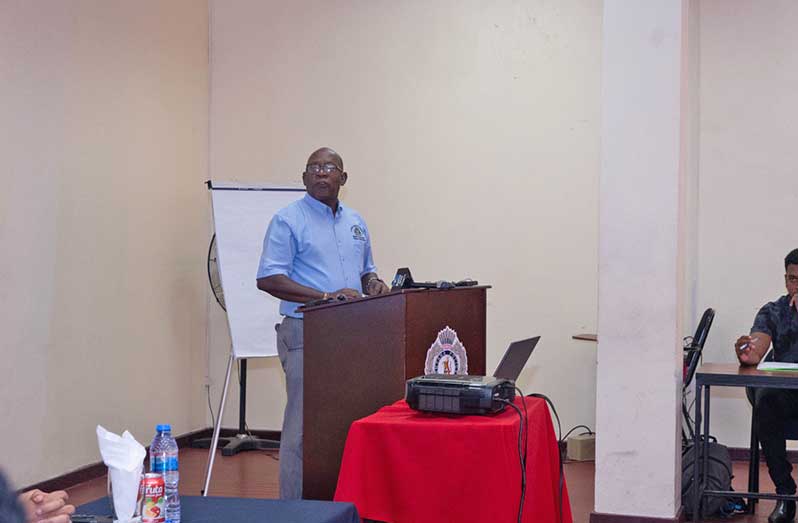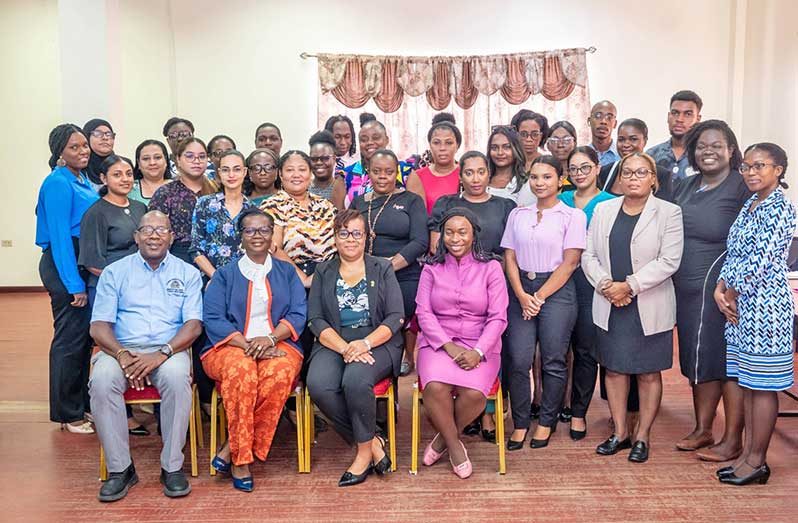ADELE Clarke, the Permanent Secretary (PS) of the Ministry of Legal Affairs, on Tuesday highlighted a transformative initiative—restorative justice—that aims to redefine Guyana’s approach to both justice and education.
She delivered this message while addressing school counsellors and welfare officers at the opening of a two-day restorative justice training at the Police Officers’ Training Centre, Camp Street, Georgetown.

She said the Ministry of Legal Affairs and Attorney General’s Chambers, in partnership with the Ministry of Education, is working to integrate restorative justice practices not only in the criminal justice system, but also within schools.
According to her, this transformative initiative aims to reduce reliance on punitive measures such as custodial sentences and pre-trial detention, as well as improve classroom management and student behaviour.
Restorative justice, as defined by the Canadian judicial system, is “an approach to justice that seeks to repair harm by providing an opportunity for those harmed and those who take responsibility for the harm to communicate about and address their needs in the aftermath of a crime.”
The system is founded on the belief that crime is a violation of people’s rights and relationships, as well as principles of respect, empathy, and inclusion.
The approach also seeks to mitigate the prison population and avoid recidivism.
“…the foundation was laid for the restorative justice practices to become an alternative to custodial sentences for minor offences in our criminal justice system through the development of relevant structures and processes,” Clarke added.
She said, too, that the process of institutionalising restorative justice is already underway, with the Attorney General’s Chambers and the Ministry of Legal Affairs taking the lead.
Importantly, the ministry is not working in isolation.
Clarke noted that the Ministry of Legal Affairs has partnered with the Probation Department of the Ministry of Human Services and Social Security to advance the expansion of restorative justice and there is a strong focus on creating awareness among citizens about its potential to improve justice outcomes across the nation.
The permanent secretary emphasised that one of the most innovative aspects of this initiative is its application in schools. She stated that restorative justice practices will be introduced in schools as tools for classroom management and behavioural challenges.
This, she noted, is a strategic move, recognising that traditional disciplinary measures such as suspensions, expulsions, and corporal punishment can sometimes exacerbate the very issues they seek to address.
“These practices have been shown to dramatically reduce discipline, referrals, suspension, expulsion and corporal punishment, offering a hopeful future for our communities,” the PS said.
In this regard, she pointed to the Education Ministry’s hopes of fostering a more empathetic and harmonious school environment, where students can reflect on their behaviour and make amends, rather than being excluded from the education process.
Director of the Restorative Justice Centre, Orrin Boston, in his opening remarks discussed the common misconception that restorative justice is solely associated with the legal profession, despite it being backed by a Restorative Justice Act.
He said that restorative justice represents a shift in approach to handling wrongdoing, extending beyond the court system to include schools and communities.

Boston added: “It is a paradigm shift in dealing with dissidents, not only as it relates to a court system, but as it relates to schools and community. It is more or less the modern, holistic way of dealing with issues that are more or less wrong, or categorised as wrongdoings.”
“Sometimes we fail to recognise that actual punishment, that is, what we know traditionally, becomes more a hindrance than a help. Research has shown that, in a lot of cases, the punitive measures that we employ with the aim of correction do not necessarily do the correction.
“Research has also shown that restorative practices give far more remedial results as it relates to amicable resolutions, as it relates to rehabilitation and as it relates to reintegration because nobody wants to be expelled from a society. It was never meant to be,” he explained.
Cornelle Leitch, Senior Schools’ Welfare Officer at the Ministry of Education said that restorative justice is presented as a method to handle situations more effectively, and the training aims to broaden the participants’ knowledge and perspectives. She acknowledged the importance of this training for addressing issues faced in educational settings.
Leitch emphasised that the ultimate objective is to reduce issues such as bullying and violence by improving behaviour and fostering a more supportive educational environment.
“This practice would be successful… We would be able to curb most of the behaviours in schools. We know bullyism and violence in schools, and all these things are high out there. Let us use this technique to see how we can do better in our schools,” she pointed out.
In Guyana, significant efforts are underway to prepare for the full implementation of restorative justice. Extensive training sessions have been conducted for judges, magistrates, prosecutors, police officers, prison officers, probation officers, and community leaders.
The training also encompasses religious leaders and school teachers. In the hinterland regions, training has been extended to toshaos, the leaders in Amerindian communities.
A Restorative Justice Centre has been established, led by a qualified director, to oversee the application of restorative justice as per the Restorative Justice Act, which was enacted in 2022.
The centre is located at Lot 341 East Street, South Cummingsburg, Georgetown. It was launched under the Support for the Criminal Justice System Programme (SCJS).
The SCJS programme is a partnership between the Government of Guyana through the Ministry of Legal Affairs and the Inter-American Development Bank (IDB).
Given Guyana’s vast geography and dispersed population, the government has admitted that implementing restorative justice nationwide presents a substantial challenge.
To address this, the government has initiated the integration of Restorative Justice Units within each Probation Department across Guyana, which are under the Ministry of Human Services and Social Security. These departments maintain a functional relationship with the country’s court systems, particularly the Magistrates’ Courts.
Notably, in Guyana, restorative justice is available only for minor/petty offences. Serious crimes such as robbery, manslaughter, murder, offences against minors and sexual offences are not covered by restorative justice.



.jpg)










